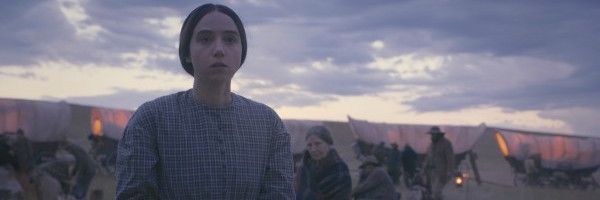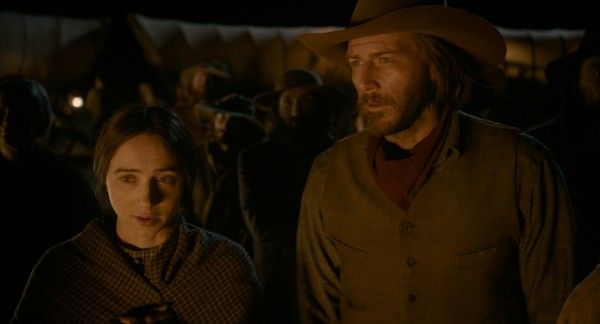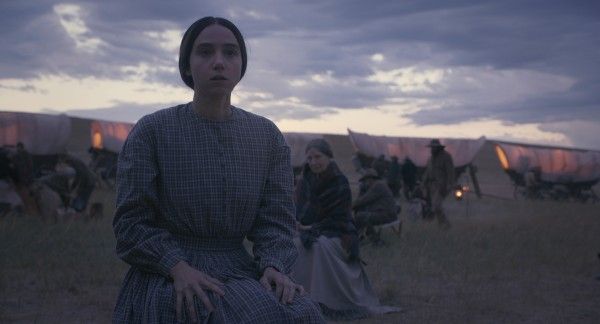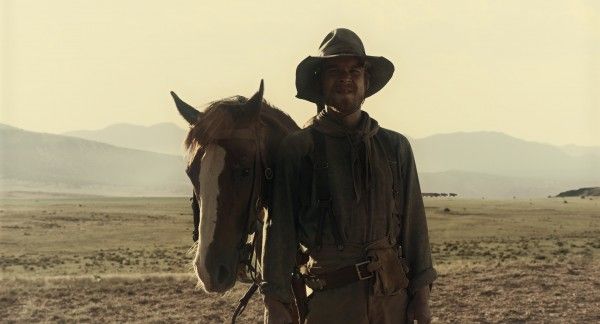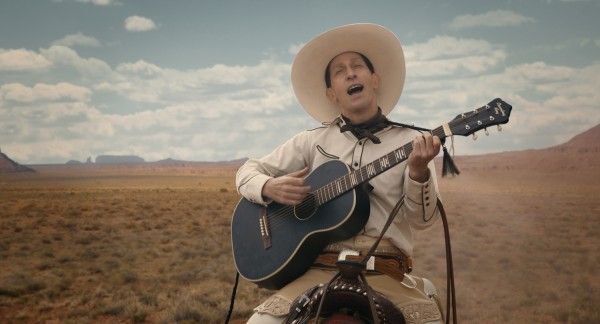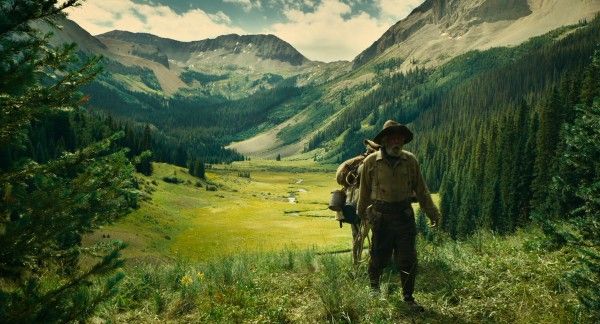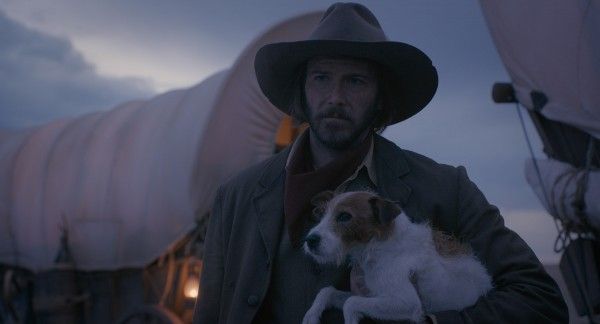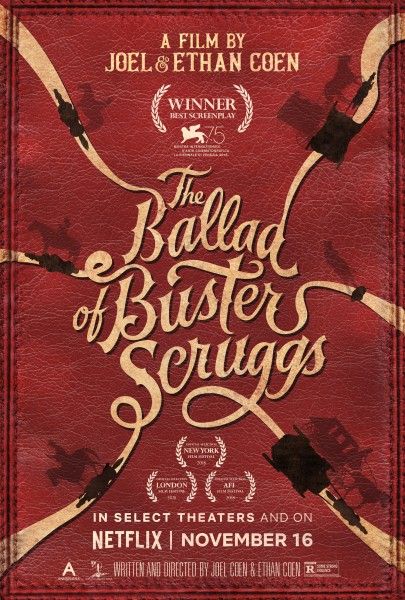From Joel and Ethan Coen, the Netflix original film The Ballad of Buster Scruggs is a six-part Western anthology in which each chapter tells a distinct and unique story about the American frontier. In the segment entitled “The Gal Who Got Rattled,” Alice Longabaugh (Zoe Kazan) meets fellow loner Billy Knapp (Bill Heck) and the two start to grow fond of each other on the Oregon Trail, until they’re faced with the sometimes savage realities of life in the American West.
During this 1-on-1 phone interview with Collider, actress Zoe Kazan talked about how she came to be a part of The Ballad of Buster Scruggs, what she loved about her character, what makes being in a Coen Brothers movie such a memorable experience, and that the filmmakers are on her list of saying a definite yes to, anytime a project of theirs might come her way. She also talked about how the experience of making Ruby Sparks compared to the experience of making Wildlife, which was directed by longtime boyfriend Paul Dano, and whether she’d ever consider directing a project, herself.
Collider: When the opportunity to be in a Coen Brothers Western came your way, what did you have to do, on your end, to ensure that opportunity became a reality?
ZOE KAZAN: Oh, my god, that’s exactly the correct question. I feel like I just got very lucky on this one, but I did work my ass off, trying to make it happen. When you see their name in your inbox, on an audition sheet, there’s no feeling quite like that one. I did as much preparation as I possibly could, and then I went in hoping that I didn’t get in my own way. I think it’s very easy to psyche yourself out, when you’re walking into a room with your heroes. I felt very lucky, on my call-back, that when I walked in it was Bill [Heck] who I was gonna be reading with because he and I had done Angels in America together. We had played husband and wife, and I knew him so well that I had this enormous feeling of relief. Having one friendly face in that room and one person that I knew how to play with already, really made a difference for me.
Are you somebody who can walk out of an audition and just forget about it and not think about it again, especially when it’s something that you really want, or is that just impossible to do?
KAZAN: No, you can’t do that! We have the weirdest job in the world because acting, on one hand, requires you to be incredibly open and have all of this access to your emotional life and the things that make you vulnerable, and then, on the other hand, the second the audition is over, you have to put all of that away and have this incredibly thick skin and be ready for any rejection. When I went in for my first audition on this, I thought I had not done as well as I could have and I felt despondent about it, walking out. We were still editing Wildlife, in the West Village where Tribeca is, so I walked all the way from like the mid 40s, on the Westside, down to Tribeca, along 7th Avenue, trying to talk myself off the ledge. I saw this pet store, and I went in and held puppies. Paul [Dano] called me and was like, “Why aren’t you here yet?” And I was like, “I’m sitting in a pet store, holding a bunch of puppies.” I was just doing anything to make myself feel better. And then, when I got this part, I put off working on it for three weeks because I was so scared to start. Where do you start, when you have your dream job? And then, eventually, you have to talk yourself into it by going, “Okay, why don’t we just take a look at the lines?”
They technically only had to give you your segment of this story, but were you given a full script to read?
KAZAN: Yeah, I was. I think all of us did, except apparently Tyne Daly, who had a Q&A in New York and said she had only read her section, but I’m assuming that was her choice. So, yeah, I read them all before I went in for my call-back, and it was actually incredibly useful. They really are all one film. The way that they interact and the way that they all relate to the genre, in a slightly different way, it was all good information for how to go in for my call-back.
What was it specifically about your segment and your character that you found yourself most identifying with or connecting to, or that really stood out for you?
KAZAN: Gosh, she was just such a beautifully written character. She reminded me of some of the Chekhov characters that I’ve played. There was something in her that feels like a person who is very rich in her life, but who’s not getting to express it in their current situation. It felt to me like she was full of thought and opinion and strength and sense of humor, but really had no access and no experience with those things, in herself. She had been told, so often, that she had nothing to say and nothing to offer that she believed that about herself. There’s something about watching this person start to learn how to stand on their own two feet, even if it’s just to ask for help. That was such a beautiful thing to read on the page. I felt so protective of her and felt so strongly, like it would be such an honor to be the person who represented her in the world.
I also love the randomness of some of the things the Coen Brothers do, like the fact that you have this dog and even have to carry him around in some of the scenes.
KAZAN: Yeah, I’ve always loved the storyline in Fargo, where she’s going to meet her friend from high school, or he says he went to high school with her, and it turns out that he’s been lying about his wife being dead. It’s such a weird grace note in that film. Why is that storyline even there? I just loved that. There’s something about that off-kilter sense of humor and the way that they think about drama and add in all of these other elements, I just find it fascinating.
Alice Longabaugh is such a interesting character because she’s so timid, but we also see her begin to realize that she could have a voice of her own, and then her story ends. Were you ever sad that you didn’t get to see her find that voice and figure out who she wanted to be?
KAZAN: Well, I felt happy for her that she found as much of herself as she did, to be totally honest. I think there’s something really beautiful, in the last scene that she has with Billy Knapp, when they’re sitting around the campfire and talking about their relationship with spirituality, and they start to realize they have something in common. They’ve made this bargain together out of practicality, and they start to see that there might be something more there. That’s just such a beautiful little grace note for her, and fills her with so much of a sense of herself and so much of a sense of pleasure and expectation. My heart broke for her. Selfishly, I loved getting to play that and feel the thrill that she had.
How did you find the experience of working and collaborating with the Coen Brothers? What makes being in a Coen Brothers film such a special and memorable experience?
KAZAN: It has to start with the writing, and they’re such extraordinary writers. I think they’ll be remembered as some of the greatest filmmakers, ever, but certainly on a very short list of screenwriters who redefine their genre. The way that they write encapsulates so much of their direction. They give you a ton of information, on the page. And then, the thing that was really remarkable to me, on set, was how relaxed they are. They’re such perfectionists and they’re so meticulous in what they want, and I expected that you would need to be micro-managed, to a certain extent, to make that happen, but they’re very relaxed and they have incredible trust in their collaborators. They’ve been working with most of their collaborators for 20 or 30 years, so there’s just the sense that everyone on set knows exactly what they’re doing and has been given exactly the permission they need to do their job while the Coens are at the helm, steering everyone and making sure that it didn’t fall off the rails. I genuinely felt their pleasure when something was going right, and that’s such a good feeling when you really hero worship people, the way that I have with them. You feel like, “I’m within the realm of giving them something that is making them happy.”
Do you have any idea what’s next for you, as an actress?
KAZAN: I don’t. I have no idea what I’m gonna do next. It’s actually an exciting feeling, right now. Most of the time, it’s horrifying, but right now, because this has been such an incredibly busy creative time for us, I’m actually excited to take a moment and figure out what I really want to do next.
How did the experience of writing and working on Wildlife compare to what you did with Ruby Sparks?
KAZAN: Oh, it was so different. Ruby Sparks happened really quickly, actually, as far as these things go. I wrote the script in the spring of 2010 and we were in production, shooting it, a year later. And then, it came out a year after that. In some ways, it was just an incredibly charmed experience. Every person that we gave it to said yes. It was also really challenging because it was the first time that I had stepped to the other side. I had written plays before, but it was really hard for me to learn how to let go and let somebody else be at the helm. I struggled with that, even though I had so much trust in my collaborator. [Jonathan Dayton and Valerie Faris] were incredibly close to me, and everyone they chose was so great. It had nothing to do with them, and it had everything to do with my own control freak-ness. I feel like I’ve really learned, in the subsequent years, how to cede control, to trust people more, and to love that part of the collaboration. I actually learned, via Ruby Sparks, how compromising on some things gives you something better, 8 out of 10 times. That’s a pretty good ratio, as long as you’re with people you trust. [Wildlife] was Paul’s baby, from the start, and it was a real learning experience, for me, in how to help him fulfill his vision. I had never written for a director before, and Paul’s vision was so clear, from the start of working on that script, that it did sometimes feel like I was a midwife, trying to help him give birth to this thing. So, it was just day and night, totally different experiences, but they were both great.
Do you find that it’s easier to be brutally honest with each other, when it comes to the work, if it’s someone that you know so well, or does that ever make things harder?
KAZAN: We’ve told a very jokey version of what happened between us on this project, which is that he wrote a first draft and I tore it to pieces, so we decided that it would be better for our relationship if I just rewrote him, rather than give him notes. But the truth behind it is that we use each other as sounding boards, all the time. He wouldn’t have given me his draft to read, if he didn’t want my input, and he is always my first reader. You’re right that the other side of that immense trust of knowing each other and knowing each other’s tastes so intimately is that we also still have to get into bed together at night, and if you’ve said something really hurtful or done some damage during the day, you have to make sure that you repair that. And then, honestly, the thing that’s the hardest is knowing when to turn it off. We love working on projects together. We love encountering the creative part of the other person’s mind. We met doing a play together. We’re very comfortable in that arena. We have to remember that we actually need to talk about something else sometimes and make sure that we’re checking in with each other emotionally, and not just going back over Act II, one more time.
You’re an actress, a writer, a producer, and now even a mother. Have you thought about adding director to that list and becoming even more multi-hyphenated?
KAZAN: I feel like watching Paul make this movie just reinforced for me how important it is to love your project, as a director, more than anything. It took so much pushing a rock up a hill to make that movie happen, and so much of that was done by Paul, alone. I definitely have an interest in that, but I want to make sure that it’s a project that’s worth all of that time and effort.
If the Coen Brothers come back to you for another project, would it be an automatic and immediate yes for you, without even reading a script?
KAZAN: I think that’s where it was always at. To be totally honest, if they had called and said, “We want her to say one word and it will be shot from behind with a telescopic lens,” I would have said, “Yes, let me come in and audition for that.”
Do you have other filmmakers that are on that same list for you?
KAZAN: Yeah. I’m not gonna tell you who they are because I wouldn’t wan to jinx things. I’ll just say that the Coens are definitely on a very short list of people that I would do anything and drop everything for. I feel so lucky that I was the person that they chose to play this role because they could have had anyone they wanted.
The Ballad of Buster Scruggs is available to stream at Netflix on November 16th.

